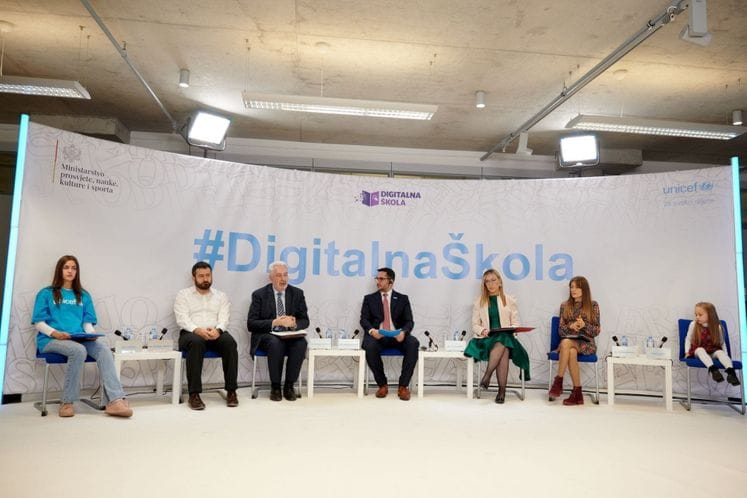- Government of Montenegro
PM Krivokapić attends the launch of the Digital Sc...
PM Krivokapić attends the launch of the Digital School platform

Digital School – a platform for learning, teaching and cooperation – is a phenomenal project that contributes to increasing digital literacy, and represents an exceptional step forward in the use of digital tools in teaching, said Prime Minister Zdravko Krivokapić during the presentation of this platform.
The Digital School is based on the Learning Passport, jointly developed by UNICEF, Microsoft and the University of Cambridge, and is currently used in 17 countries around the world.
Disruptions in education caused by the pandemic have given us a unique opportunity to reinvent education for this generation – to transform the way children learn and acquire skills to meet the demands of the 21st century, said Executive Director of UNICEF Henrietta Fore.
Digital School is aligned with the teaching and learning in person, and its goal is to strengthen the quality and inclusivity of education during and after the COVID-19 pandemic. It is available via smartphone, tablet and accounts on www.digitalnaskola.edu, and all students, teachers and parents can access it from their edu.me email address. It provides a range of quality digital content, including 400 courses with 8,000 lessons. The content is currently focused on supporting early learning and the first three grades of primary education, but this platform also offers digital materials for other levels of education. The plan is to expand the platform to cover all grades all the way to the end of high school.
Minister of Education, Science, Culture and Sports Vesna Bratić pointed out that further work on improving the platform was also identified in the Strategy for Digitization of the Education System .
By constantly improving the teaching content, building the capacities of staff working in educational institutions, digitalization and modernization of the educational system, we are striving to create better conditions for the quality education of young people, we are investing in young people and their knowledge, thus investing in our common future, said Bratić.
UNICEF Regional Director for Europe and Central Asia Afshan Khan reminded that during the period when schools were closed, almost every fifth family in Montenegro did not have access to a computer connected to the Internet, which would have enabled the children to continue learning.
In order to solve this, it is very important that the government and its partners make it a priority to connect all children and young people to the Internet, including the most vulnerable, and to make digital learning accessible to all children and young people, she added.
Digital School offers preschool children an abundance of educational interactive games, and elementary and high school students can find classes from the #UčiDoma platform, which is supplemented by guidelines for independent learning, exercises, tests and interactive activities. Materials to support inclusive education are also available, as well as useful resources for informal education related to online security, violence prevention, sports, health, digital technologies, etc.
Microsoft’s Education Lead for Central and Eastern Europe Albena Spasova said that Montenegro has applied an ambitious and innovative approach to the development of Digital School, through which the platform has been expanded, new solutions have been implemented, which are focused on students’ needs, thus providing better support to the education system.
UNICEF Representative to Montenegro Juan Santander said that ensuring the right of every child to a quality education is an effort of the whole society.
Supporting teachers must be a priority in these efforts, because their role has never been more important in creating a safe and stimulating learning environment, and no reform can be successful without their participation from the start, he said.
Digital School will be useful in helping teachers create effective work plans, strengthen the quality of inclusive education, and improve pedagogy, access to training on information and communication technologies, etc.
This is a tool that provides students with a different and more familiar form of learning, and gives teachers the opportunity to attend additional training, which is available on the platform, at a time that suits them, said teacher Mladen Janković.
The platform also offers parents a range of useful content on parenting and healthy living styles.
When I joined Digital School, I felt safe and found concrete guidelines that help parents cope with challenges and help their children, said Jelena Đurović, mother of a little girl named Jana.
UNICEF young reporter Ana Lazović, a high school student, pointed out that there is currently a limited amount of material on the platform intended for her peers, but that she definitely recommends that they use it. She also made a proposal for further improvement of the platform.
What I would like to see in the future is for the platform to also offer the opportunity to evaluate it, i.e. for us as users to be able to give feedback on our user experience and send those materials of ours that we find useful, and in this way we can participate in improving the platform, she said.
UNICEF will continue to support the Government of Montenegro in the further development of Digital School in the forthcoming period, as well as in providing access to this platform for every child and adolescent in the country.

